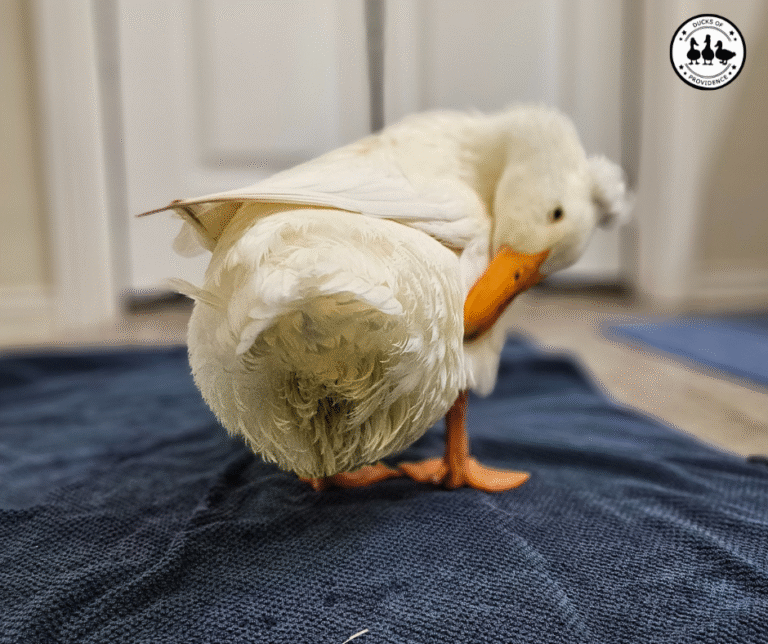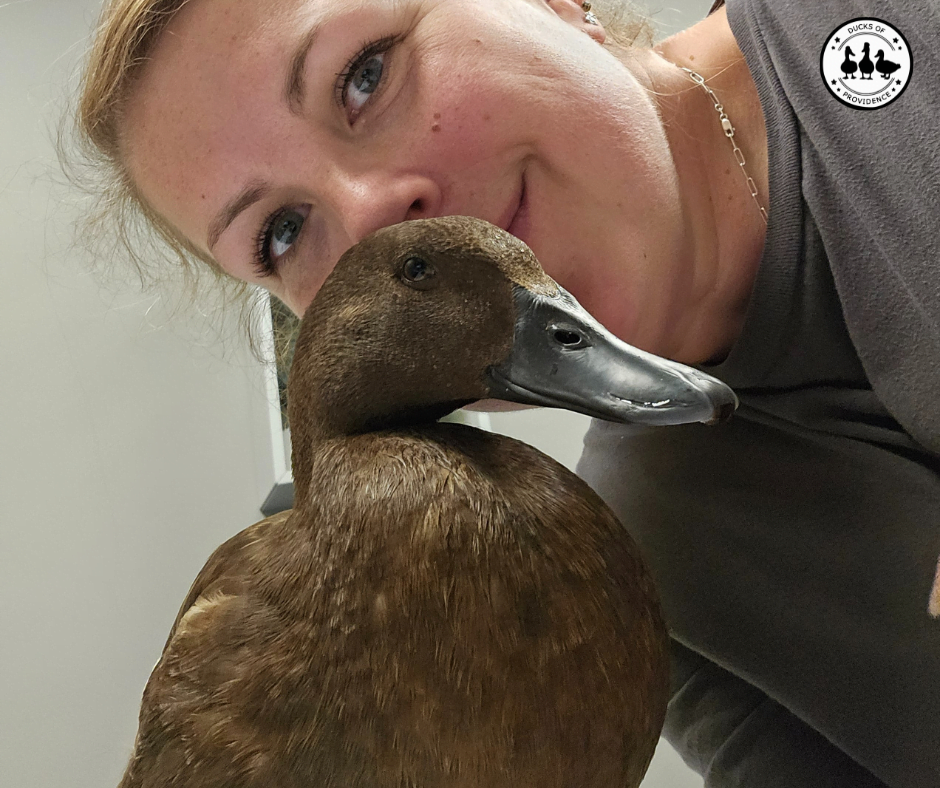
Krümel’s Health Journey (Case Study)
Last updated on September 27th, 2024 at 05:47 pm
I have some heavy news to share with you today, and it’s been an emotional rollercoaster for us here at Ducks of Providence. Our beloved Krümel is facing some serious health issues, and it’s breaking my heart. 😥💔
The First Signs of Trouble
Many of you might remember that I’ve previously shared about Krümel’s egg-laying problems. She has struggled with laying soft and thin-shelled eggs, often at odd times of the day when the shells aren’t fully formed. On some days, she’d lay a normal egg in the morning, only to lay a soft egg in the evening.
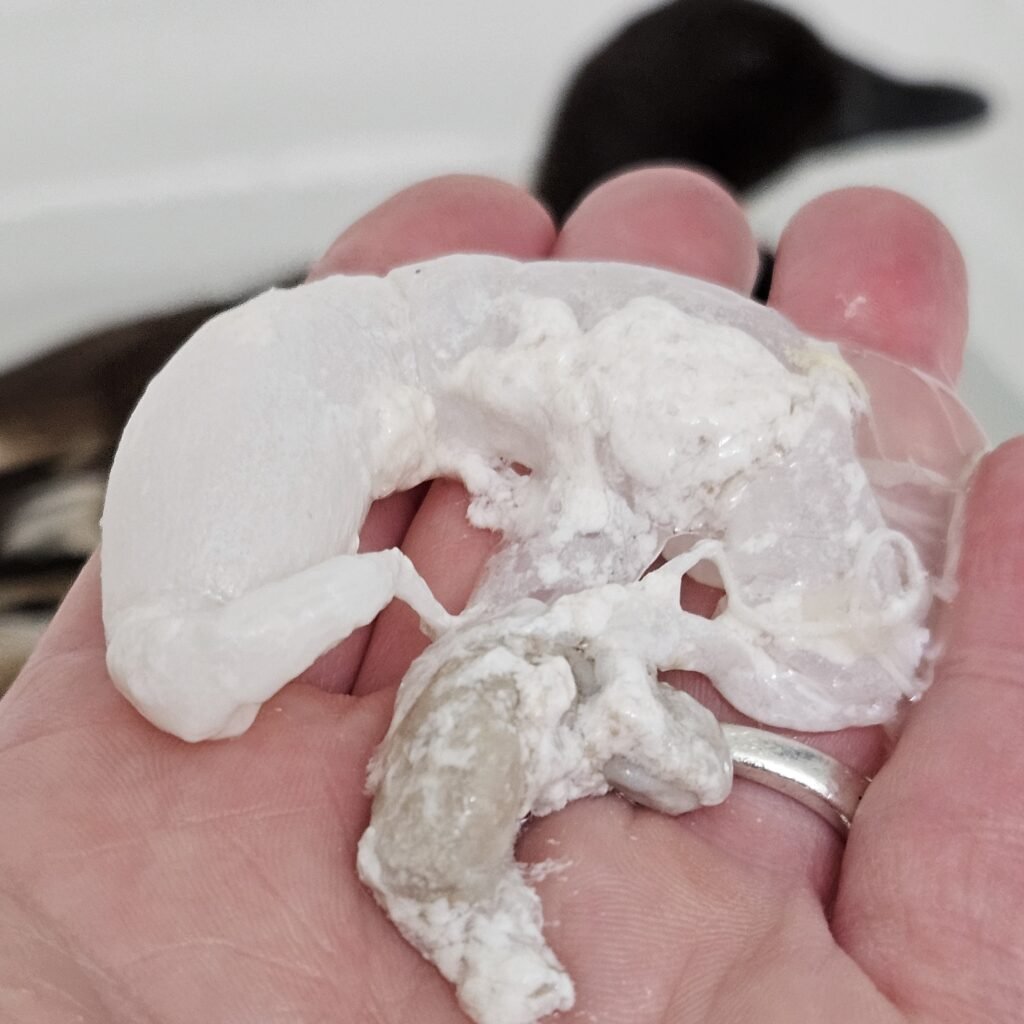
During these times, Krümel was clearly in pain and discomfort. She would strain, pant, lose her appetite, and become lethargic. It was heart-wrenching to watch her suffer. We tried everything to help her feel better—Epsom salt baths, calcium supplements, and sometimes pain medication.
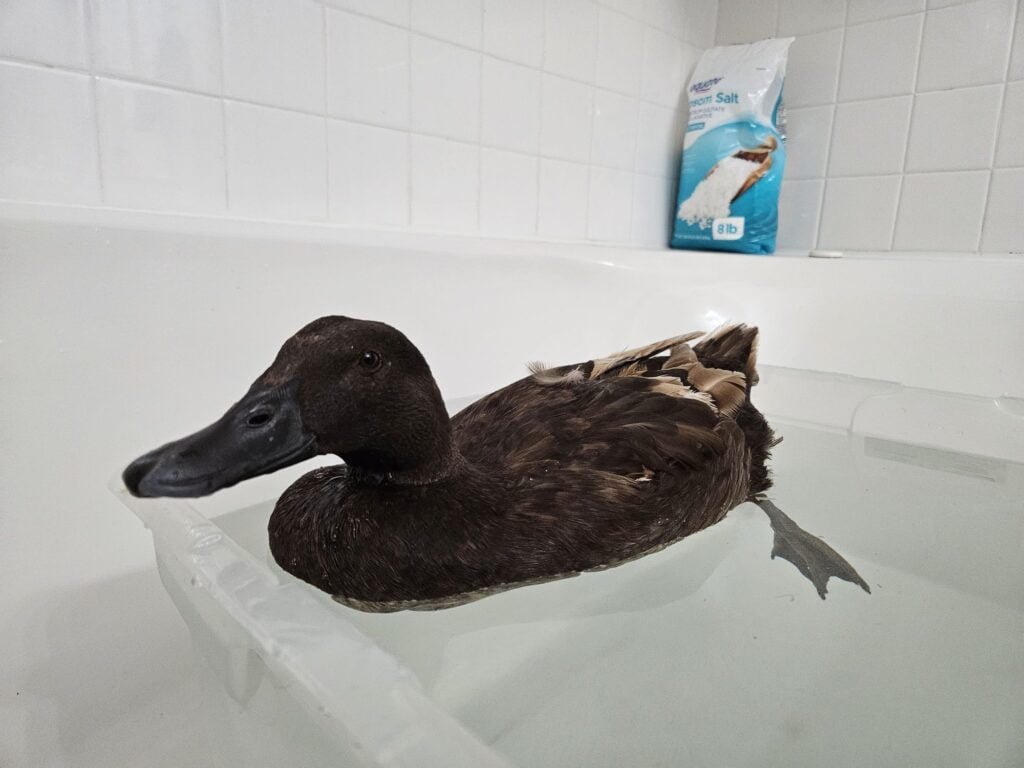
We initially thought it was a calcium deficiency or reproductive issues. It started sporadically but became more frequent, and she seemed to be in more pain each time. She became sensitive to touch, twitching and making odd bending motions, sometimes even adopting the ‘penguin stance.’ This stance, where she waddles more upright, is a classic sign of a duck struggling with egg-binding issues, and it was a clear signal that something was seriously wrong.
A Trip to the Vet
It was time to consult the vet. The initial thought was that Krümel might need to be spayed, but our vet suggested we do some blood work first to rule out other possibilities. The results were alarming—almost all of her values were abnormal.

Our vet suspects pancreatitis, liver disease, possibly a virus like hepatitis B or herpes, and in the worst-case scenario, even cancer. Hearing these possibilities was devastating. I couldn’t help but cry thinking about my little baby. 😥
| Test | Result |
|---|---|
| Hematocrit | 31.0 % |
| WBC Estimate | 21.0-23.0 THOUS |
| WBC | 22.0 K/μL |
| % Heterophils | 47 % |
| % Lymphocytes | 48.0 % |
| % Monocytes | 3.0 % |
| % Eosinophils | 2.0 % |
| % Basophils | 0.0 % |
| Heterophils | 10.34 K/μL |
| Lymphocytes | 10.56 K/μL |
| Monocytes | 0.66 K/μL |
| Eosinophils | 0.44 K/μL |
| Basophils | 0 K/μL |
| Thrombocytes | ADEQUATE |
| Polychromasia | SLIGHT |
| Blood Parasites | No parasites seen |
| Plasma Protein | 8.5 g/dL |
| Glucose a | <10 mg/dL |
| Uric Acid | 3.7 mg/dL |
| Phosphorus | 14.3 mg/dL |
| Calcium a | 47.0 mg/dL |
| Sodium | 141 mmol/L |
| Potassium | 6.8 mmol/L |
| Total Protein | 6.0 g/dL |
| Albumin | 2.2 g/dL |
| Globulin | 3.8 g/dL |
| Albumin:Globulin Ratio | 0.6 |
| AST | 19 U/L |
| ALP | 32 U/L |
| LDH | 320 U/L |
| Cholesterol | 162 mg/dL |
| Amylase | 6,906 U/L |
| Creatine Kinase | 162 U/L |
When we see elevated levels of amylase and LDH in our ducks, it often points to pancreatitis or a viral disease. Abnormal liver values, including total protein, albumin, globulin, AST, and ALP, signal inflammation that might stem from pancreatitis, a viral disease, another primary liver condition, or even cancer.
High levels of phosphorus, calcium, and potassium could be a secondary effect of protein imbalances and might not always be accurate. However, these elevated values are sometimes associated with certain types of cancer.
Lastly, abnormal CBC results—such as changes in hematocrit, white blood count, heterophils, lymphocytes, and eosinophils—indicate chronic disease, inflammation, and/or infection. These issues could be viral, inflammatory, or bacterial in nature.
Seeking Specialist Care
We were referred to the Texas Avian & Exotic Hospital to see a specialist. We spent three hours at the clinic plus two hours driving. Dr. Antinoff conducted a thorough examination, including X-rays and an ultrasound, and performed additional blood work to check for metals just to be safe.

Finding avian veterinarians is not easy—these specialists are rare and have expertise in treating birds, which often requires more advanced diagnostic tools and knowledge than regular vets might have. The staff at the hospital were incredibly kind and patient. They handled Krümel with such care, and it was a relief to know she was in good hands. The tests were extensive—Krümel had to undergo several procedures, and she was so brave throughout it all.
The Diagnosis
After reviewing all the results, it was confirmed that Krümel indeed has reproductive issues. The blood values indicated chronic infections and inflammation. Despite having enough calcium and phosphorus to produce strong eggshells (her bones are strong, too), her reproductive system isn’t functioning properly, leading to the soft eggs and her struggles to lay them.
The good news is that her liver and intestines looked fine—no interstitial fluids or masses. However, there were several eggs already lined up in her oviduct, one in the shell gland, which she laid on the way home (soft and broken, of course). This confirmed that her body was trying to produce eggs but failing to complete the process correctly.
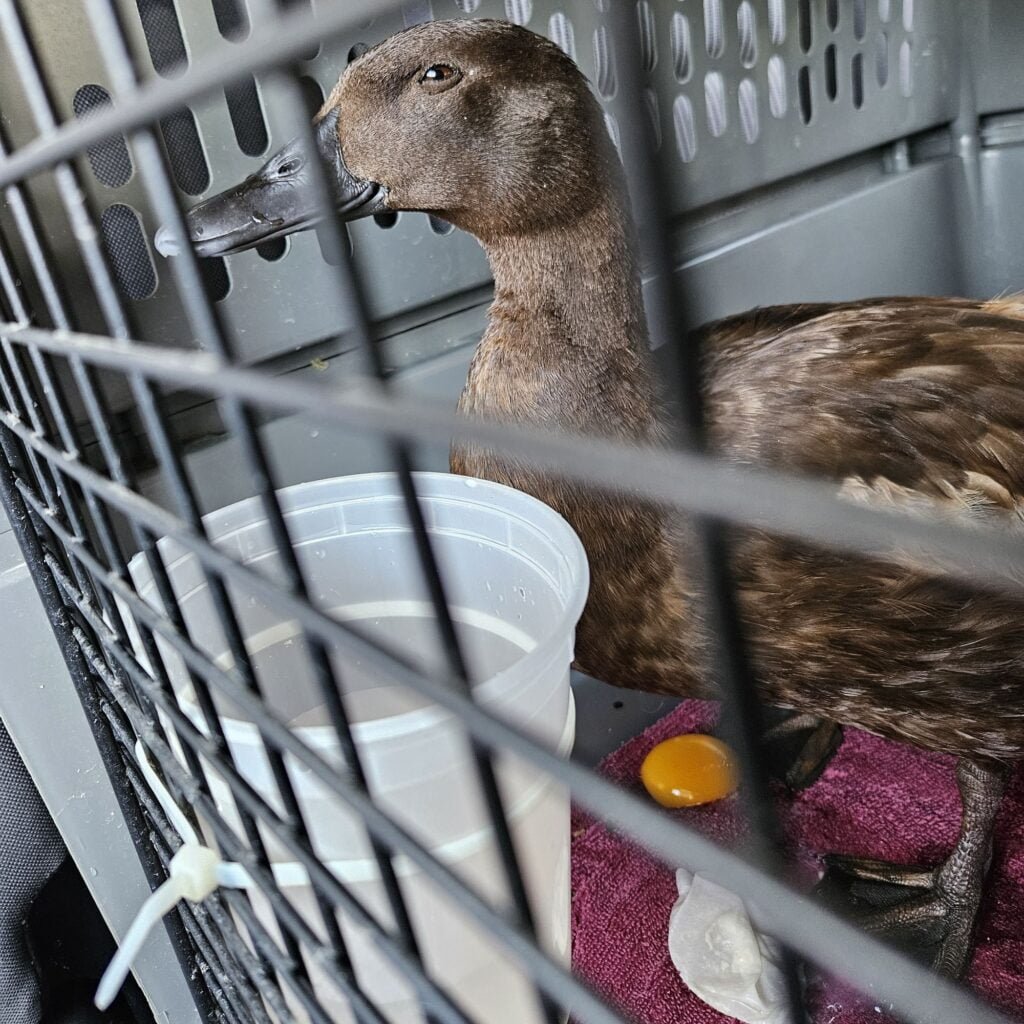
The Treatment Plan
Krümel received two hormone implants (deslorelin) to give her a break from egg-laying, allowing her body to heal and recover. These implants work by suppressing her reproductive hormones, which should help reduce the strain on her body and give her the much-needed rest from egg production. She will be on antibiotics (Trimethoprim-Sulfa Ped Suspension 48 mg/ml) for the next three weeks to clear the infection and anti-inflammatory medication for a few days.
She’s very exhausted, and so am I, but I’m relieved that we now know what the issue is and that it isn’t more serious. We have a solid plan in place to help her. Watching her go through this has been incredibly tough, but knowing there’s a path forward gives me hope.
The Aftermath
Krümel wasn’t allowed to get into the water for 24 hours after receiving her implants, so you can imagine how happy she was to finally take a dip. Despite having a big pool, she chose the water bowl instead—silly duck! This is classic Krümel behavior; she loves the small things even when the bigger options are available.
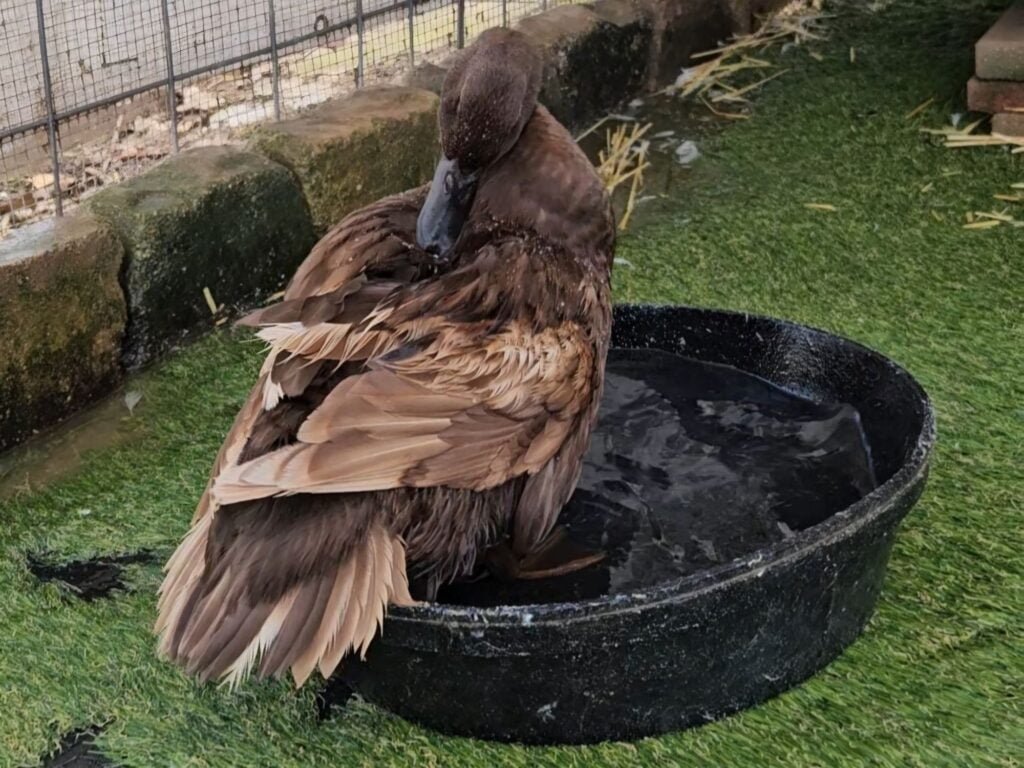
She was also a bit irritated by the implants and the small wound under her right shoulder/wing, showing particular interest in that area. Ducks can be very sensitive to changes in their bodies, and it was evident that she was feeling a bit uncomfortable. However, she soon settled down and seemed more at ease.
A Positive Sign: Krümel’s Molt
After about ten days with the implants, Krümel has begun to molt. This was expected with her hormone implants and is actually a good sign. It indicates that her body is responding to the treatment. She is almost two years old and has not had a major molt yet, so this was definitely overdue. A molt allows ducks to shed old feathers and grow new ones, which is vital for their overall health and well-being. Seeing her start this process is a hopeful indication that she’s on the road to recovery.
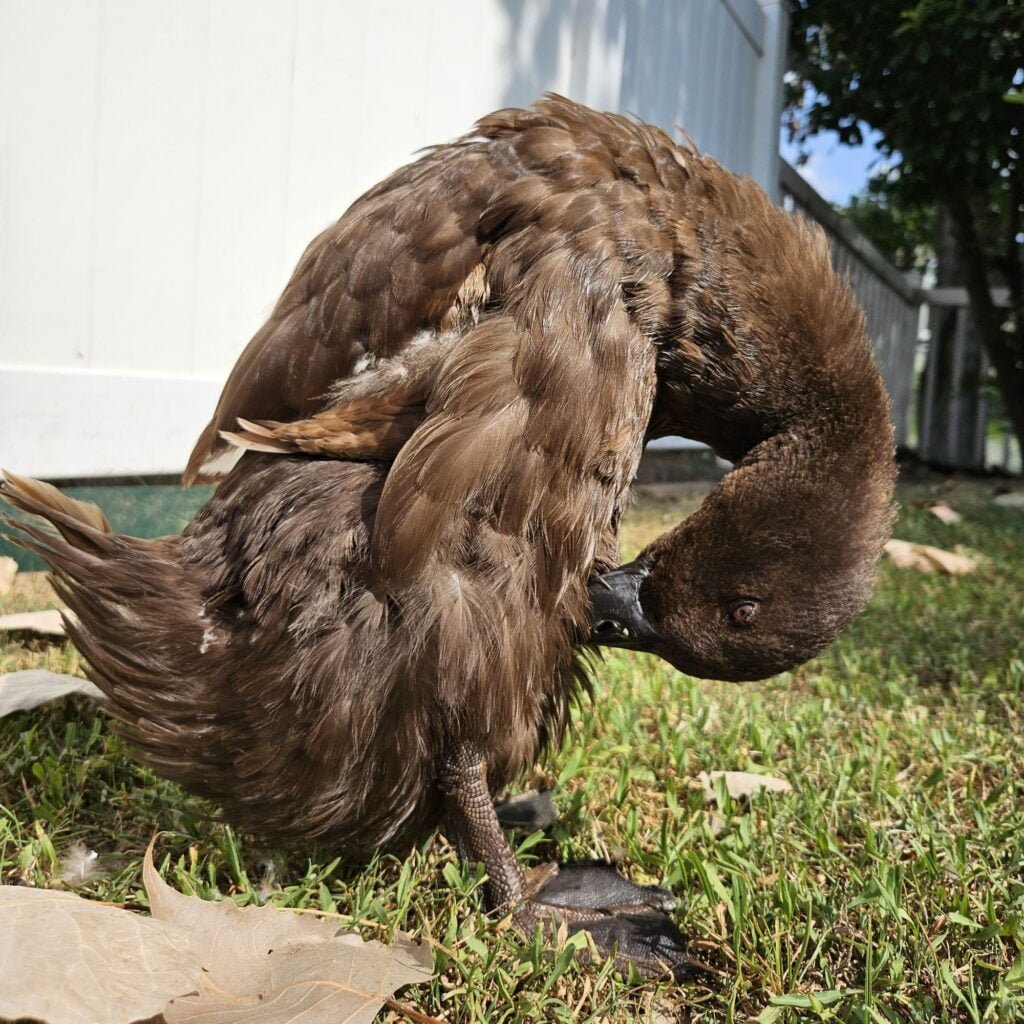
New Updates: The Mystery Deepens
The results from the additional blood work came back, and it turns out that Krümel has extremely elevated zinc levels. Our vet explained that this could be the reason for her high pancreatic levels and may also contribute to her egg problems by interfering with shell production. Elevated zinc can cause significant health issues in birds, including toxicity that affects their organs and overall well-being.
To address this, Krümel will now receive a chelating agent to bind the metal. Chelation therapy is used to remove heavy metals from the body, and it should help reduce the zinc levels in her system. ❤️🩹
Poor girl. Now we need to find out where she got this from and if the other ducks are also affected. This means checking her environment for possible sources of zinc, such as galvanized metal objects or certain types of feed. It’s a daunting task, but it’s necessary to ensure the safety of our entire flock.
➡️ Read more about metal poisoning in ducks.
Environmental Investigation
One significant task ahead of us is identifying the source of the elevated zinc in Krümel’s environment. This involves a thorough examination of her living area and diet. We will check for any potential sources of zinc contamination, such as galvanized metal objects, which can leach zinc if they are corroded or damaged. Certain types of feed can also contain higher levels of zinc, so we will review and possibly adjust her diet to eliminate any potential sources.
Ensuring that the other ducks in our flock are not affected is also a priority. We will monitor their health closely and consider testing their blood for zinc levels and other abnormalities. Preventing similar issues in the rest of our flock is essential to maintaining their well-being.
Emotional and Financial Support
Emotionally, this journey has been taxing for both Krümel and me. Watching her struggle and knowing she is in pain has been heartbreaking. However, seeing her start to recover, even with small steps like beginning her molt, brings a sense of hope and relief. The love and support from our community have been invaluable. Your positive thoughts, well wishes, and shared experiences provide comfort and encouragement during these challenging times.

I must also mention that the treatment has been very expensive. We’ve spent over $1,600 on Krümel’s diagnosis and care so far. Avian specialists are rare, and their expertise comes at a high cost, but it’s essential for providing the best care for our feathered friends. To help cover these expenses, we’ve started a fundraiser. Contributions, no matter how small, will go directly towards Krümel’s medical bills and ongoing care. Your support is deeply appreciated and makes a significant difference in Krümel’s recovery journey.
Looking Ahead
We remain hopeful and determined to get Krümel back to full health. The road ahead may be long and filled with challenges, but with a solid treatment plan, the expertise of avian specialists, and the unwavering support of our community, we believe Krümel can overcome these obstacles.
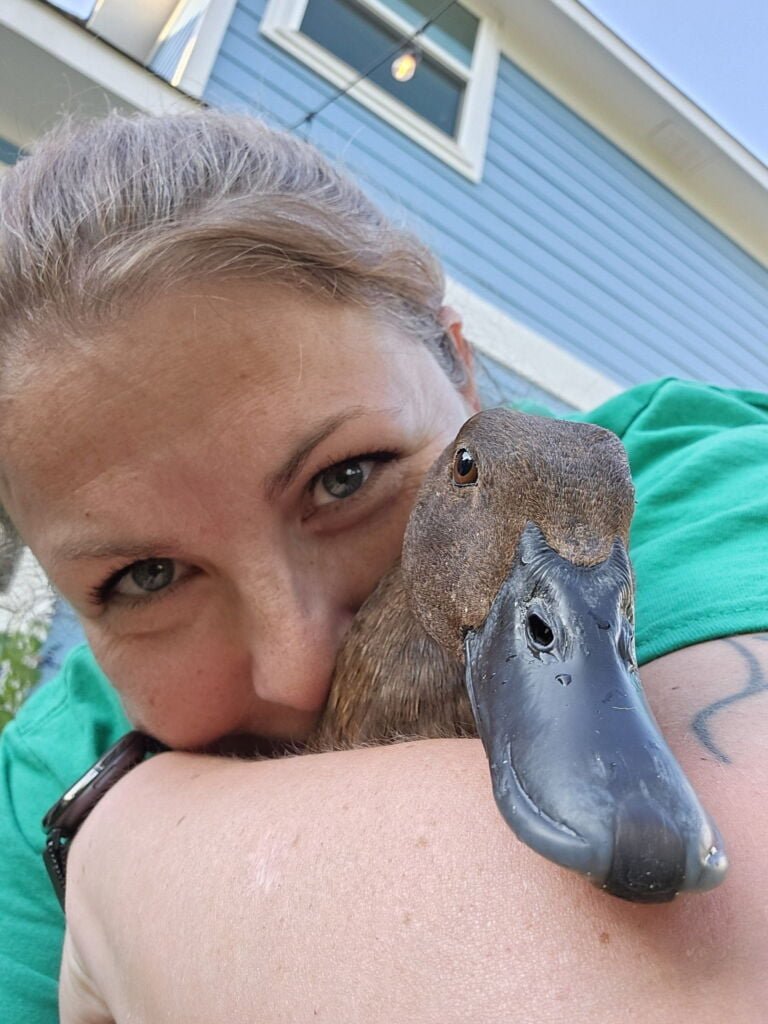
Please keep your fingers crossed for us as we navigate this journey. I will keep you all updated on her progress and any new developments. If any of you have experienced similar issues with your ducks, your stories and advice would be greatly appreciated. Together, we can ensure that our feathered friends receive the best care possible.❤️🩹
Thank you for being part of our duck-loving community. Your positive thoughts and well wishes for Krümel are greatly appreciated.
Quacks and hugs,
Melanie

